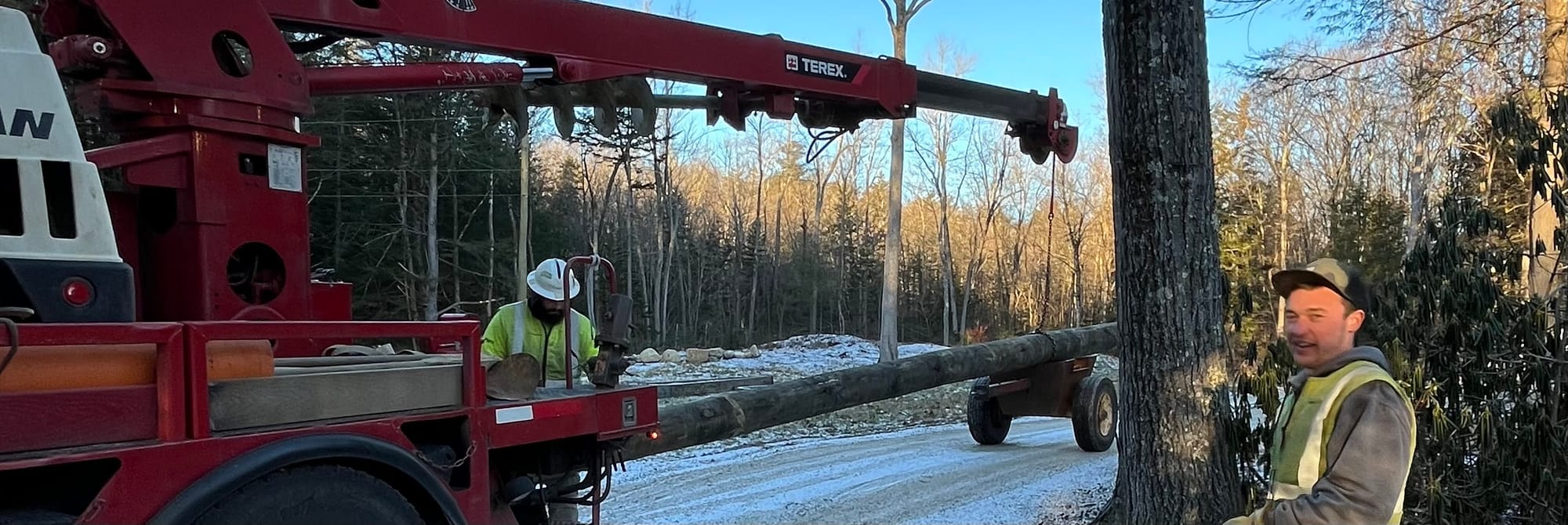Nothing Much Happens
If you had to pick one thing to describe rural life, it could easily be that nothing much new ever happens.

The local utility company, Eversource, is swapping out telephone poles in the woods around us. We needed that.
Nearly two years ago we got the attention of a service person who was onsite to update household meters shortly after we had cleared about an acre of land. The clearing had exposed lines dangerously low to the ground as a consequence of being strung, long ago, between poles too far apart. By long ago, I mean over fifty years, when it was farmland, and they were using small, twenty-five-foot poles not much bigger around than your leg. I never knew this, but telephone poles have a “born on” date, the term this service worker used. The low wires caught his eye, and I followed him around as he inspected poles on our property. He was an affable guy, with a genuine interest in the historical record, snapping pictures of the metal numbers and disks on each pole with his iPhone.
“This one is almost ninety years old,” he said slapping the pole in the corner of the lot that had always listed to the side with the transformer. It is set next to the creek that runs along the back of the field. Spring and fall, the water comes over the top of your boot if you are wandering around out there.
He must have showed the pictures to the right person, because two days later a white SUV appeared out of which stepped a guy in crisp khakis, clean shirt, a good pair of boots, and Eversource parka. He marched out to the middle of the field and stood there looking both ways for a while, then over to the corner pole, then followed the creek into the woods toward our neighbor’s property. I had a good vantage point on all this from my studio and saw him reappear on the driveway further down, which is when I threw on my coat and went to meet him.
He introduced himself as an engineer. Whereas the service worker was happy to have me follow him around it was clear the engineer was not. Not if I was going to start asking engineering questions. I retreated. By the time he left, he had driven a few wooden stakes into the ground, wrapped colorful tape around poles, and affixed little red flags to them. We would be getting more than one new pole.
Nothing happened for a year. Then, early last spring, a red bucket truck came down the driveway towing a big pole. Very big. Nearly twice the size of the toothpicks we were used to.
“How tall is that?” I asked, anxious about the idea of this substantial totem going up in our new field.
“Forty feet,” answered one of the installers. “Minimum requirement. They don’t even make those little ones anymore,” pointing to a toothpick.
The bucket truck got stuck repeatedly trying to get to the position where the engineer had guided them with a stake and flag. The crew was on site for the whole afternoon. They left behind deep tire tracks, but the height of the new pole all but caused the previously low hanging wires to disappear from view. Honestly, as the sun hits them, they vanish. It is brilliant.
So, after coming to us that day two years before, we imagine the engineer drove his SUV down other dirt roads, hiked a short way into neighboring woods, planted other flags, and determined the need for general renewal. Finally, several crews descended this month with a brief to replace thirty poles, including four more around us. And this time, they arrived with half-tracks suited for rolling around the woods.
If you had to pick one thing to describe rural life, it could easily be that nothing much new ever happens. I can’t imagine dropping what I was doing to engage men and woman planting new telephone poles when we lived in suburban Boston. Life there went on against a background loop of change that continued without notice. The only time a utility company worker ever got my attention was when an unfortunate squirrel shorted the power line as it scampered home. The resulting explosion brought us all outside to meet the repair crew, which quickly diagnosed the problem, pointing to the charred, smoking remains of the poor creature on the ground. A veritable fossil at that point, it fell to me to remove it with a shovel, becoming the only sort of thing to punch through the dull routine of change we were used to.
Comcast has added to the frenzy of thirty new telephone poles by arriving to string cable. It presents some sort of paradox, because the last time I experienced the arrival of cable to my door was in New York City, in 1979, when it reached East 79th street from across town. Moments away from 2024–almost fifty years later—it is happening again. Five hundred channels, twenty-four seven, over hill and dale to the woods of southern New Hampshire, where nothing much new ever happens.
Do we need that?

